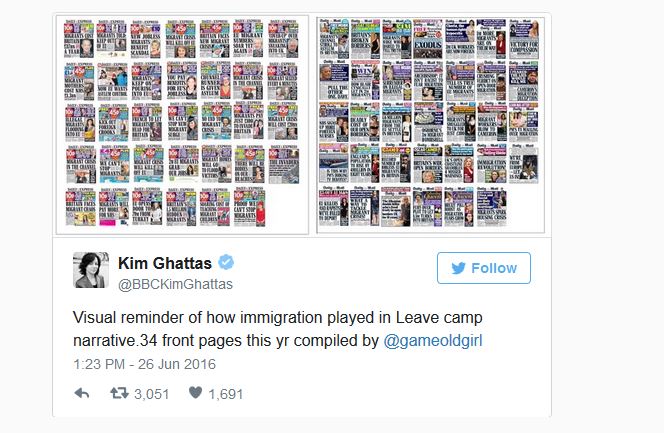A month before Britain voted in one of the most important referendums in a generation, the campaign to leave the European Union seemed to be losing steam.
The British public, it appeared, was not convinced that life without the EU would make them freer or more prosperous. Economists were making stark warnings of a downturn if the UK pulled out of the 28-member bloc. The polls indicated the “remain” camp was edging ahead.
Then, the “leave” campaign changed tack. It shifted focus to immigration — specifically, how to bring it to a screeching halt.
Polling had revealed that immigration was a key concern for many who were thinking of voting to leave the EU. Nearly 75 percent of prospective “leave” voters cited immigration as the most important issue in the referendum, at a time when migrants were coming to the UK at near-record levels.
One government minister in support of Britain’s exit, or Brexit, told the BBC: “’Vote Leave’ does not want to major on immigration, but the problem is that on the economy we are playing defense.”
The result of this pivot was predictably ugly.
A campaign low arrived in the form of a poster showing thousands of refugees crossing the Croatia-Slovenia border last year. The words “BREAKING POINT” were emblazoned across the picture, above a line that read: “We must break free of the EU and take back control of our borders.”
It didn’t matter that many of those pictured were likely refugees fleeing war and violence in the Middle East. Nigel Farage, the leader of the far-right UK Independence Party (UKIP), which produced the poster, sought to make the link in voters’ minds between the refugee crisis in mainland Europe and immigration.
Yvette Cooper, an opposition Labour Party parliamentarian and “remain” supporter, was among the many who condemned the poster: “Just when you thought ‘leave’ campaigners couldn’t stoop any lower, they are now exploiting the misery of the Syrian refugee crisis in the most dishonest and immoral way.”
Others pointed out the similarity it bore to Germany’s World War II propaganda.
Even Boris Johnson, the former London mayor who led the “leave” campaign, distanced himself from the poster. Farage defended it, saying its purpose “was to say that Europe isn’t working.” He added: “Something that’s true can’t be a scare.”
After more than a year of images of refugees crossing EU borders, the poster had a potent effect.
Much of the British public’s reaction to asylum seekers reaching Europe’s shores was initially positive, but the terrorist attacks in Paris in November 2015 appeared to harden views. In December of last year, 44 percent of Britons said the country should close its borders entirely to refugees, up 4 points from October.
The UK agreed to resettle some 20,000 Syrian refugees by the end of the parliamentary term in 2020. Net migration to the UK in 2015 was 333,000, the country’s second-highest annual total recorded. But last year, the UK received approximately 60 asylum applications per 100,000 UK citizens — well below the EU-wide average of 260 per 100,000.
It wasn’t just the Paris attacks that shaped Britain’s view of the refugee crisis and, in turn, of EU membership. Right-wing British newspapers have long carried incendiary stories about refugees, focusing for instance on rare cases of asylum seekers receiving benefits and homes before locally born citizens.
As more families fled to the EU last year, the media messaging intensified: A study by Cardiff University on press coverage across Europe found “the right-wing press in the United Kingdom expressed a hostility towards refugees and migrants which was unique.” Considering some of the competition, that’s pretty remarkable.
It added: “Whilst newspapers in all countries featured anti-refugee and anti-migrant perspectives, what distinguished the right of centre press in the UK was the degree to which that section of the press campaigned aggressively against refugees and migrants.”
The “leave” campaign’s slogan to “take back control” was, in the minds of many voters, a promise to reduce immigration.
Since Thursday’s referendum, there have been reports of nationalist anti-foreigner outbursts, which social media users have been documenting (such as here and here).
It is impossible to know how much impact the refugee crisis had on the referendum. One thing is clear: The “leave” campaign’s focus on migration played a significant role. By using the plight of civilians fleeing conflict and instability to further its case, UKIP and those who campaigned alongside it stoked long-held fears and concerns.
In many ways, the referendum result was a riposte to years of immigration policies that most of the British public disliked. Many felt their concerns were ignored. It is likely to remain an issue in elections to come.
But the great irony of the poster incident is that the number of refugees the country takes in is something the UK does control — while immigration to the UK from other EU countries is not. Freedom of movement is one of the key tenets of EU membership. And even now that the UK has decided to leave the EU, it is unclear how any future government will be able to do much better at reducing immigration without seriously damaging the UK economy.
This story was first published on PRI.org.



